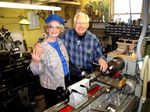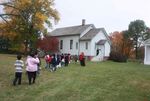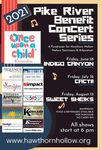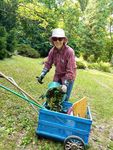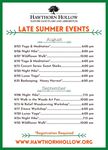A Lasting Legacy The Heide Family at Hawthorn Hollow
←
→
Page content transcription
If your browser does not render page correctly, please read the page content below
A Lasting Legacy
The Heide Family at Hawthorn Hollow
On May 30th, longtime Hawthorn Hollow While Chuck and Kathryn tried to avoid the
benefactor Charles H. Heide Sr. passed spotlight, one of their gifts was just too
away at the age of 98. Charles, or Chuck great to be ignored. The Charles and
as he preferred to be called, and his wife Kathryn Heide Schoolyard Observatory
Kathryn have played a huge part in stands in the middle of our Arboretum, and
Hawthorn Hollow’s success over the past their financial support has allowed us to
50+ years. hire two staff members to run the
observatory and its many programs (see
Chuck’s parents, Christen & Anna Heide,
pg. 3).
were neighbors of Ruth & Margaret
Teuscher, the owners of what we now know “Our family feels we are part of a team. A
as Hawthorn Hollow Nature Sanctuary and team that steps up and does its part when
Arboretum. They helped save and move the need arises.” says Reck, who
the historic 1906 Somers Schoolhouse to Charles & Kathryn Heide represents the third generation of the Heide
our property, and worked closely with the Legacy at Hawthorn Hollow. But for her,
Teuscher Sisters while they were converting Hawthorn Hawthorn Hollow is more than just a family responsibility.
Hollow into a premier nature sanctuary. Chuck took up the Some of her fondest memories are of Hawthorn Hollow,
torch and served on the Hyslop Foundation’s Board of whether it’s ice skating down the Pike River from her
Directors for decades, continuing the Heide Family’s family’s home to the Hawthorn Hollow Bridge, seeing Ruth
involvement as Hawthorn Hollow grew. lead tours in an 1800’s dress, and even sneaking into the
schoolhouse to ring the bell!
“My dad didn't like to be in the spotlight. He liked to survey
a situation and get things done.” says Krista Reck, Chuck’s When asked about Hawthorn Hollow’s growth, Krista said “I
daughter and a longtime Hawthorn Hollow supporter and don't necessarily see HH changing. It is a place of refuge
Hyslop Foundation Board Member herself. As Hyslop and rejuvenation, both for people and wildlife. What will
Board President, Krista helped guide Hawthorn Hollow change is how we manage the landscape and educational
through the COVID shutdown and played a huge part in its programming so people can care for Hawthorn Hollow and
survival. She says “The Teuscher sisters asked for help to their own properties. We will have more public space and
preserve Hawthorn Hollow and that is the legacy we (the there will be a bigger parking lot, but the woods, prairie, and
Heide family) are part of.” Arboretum are constant”.Friendly Faces at the Hollow
The 2021 summer season is in full swing and there are several new seasonal staff and volunteers working hard
around the grounds.
Caden Broesch, Leah Blanchard, and James Gorsline have been working on the Wetland/Ravine Restoration
Project with our Restoration Ecologist, Lori Artiomow. James is also our educational coordinator who will be
joining the team at Yosemite National Park. We wish him well!
Hawthorn Hollow’s Farm Manager Allison Garren and her team of Kassandra, Ana, Bella, Iyanna, and Jojo are
working hard at the Heritage Farmstead in the Organic Outreach program. Matt Deacon and Sam Speca are
making the grounds sparkle with the help of fantastic volunteers like Kadge, Janis Laufenberg, Dave Sessa,
Susie Brock, Ginger Friedrich and more. Thanks for your help!
The Humble Bumble Bee Some of Hawthorn
Hollow’s Resident
July and August are the perfect months to observe which bumble bees are visiting your yard. Bumble Bees
Wisconsin has about 20 different species of bumble bees. They all look a bit different from
each other and with a little practice you can learn to identify the different species. a. Bombus bimaculatus
The Wisconsin Department of Natural Resources has a program for citizen scientists b. Bombus grisiocollis
interested in helping document which bumble bee species are foraging in what areas of the c. Bombus affinis
state. The program is called Bumble Bee Brigade and it helps WDNR staff understand how d. Bombus rufofinctus
bumble bees are doing in Wisconsin.
e. Bombus impatiens
Bumblebees, just like honey bees, are declining in numbers. It’s important for all of us to do
what we can increase pollinator habitat by planting and cultivating native plant species in our f. Bombus fervidus
yards to provide our pollinators the pollen and
nectar resources they need to survive.
To help WDNR staff monitor bumble bee trends
in Wisconsin, you can become a Bumble Bee
Brigade participant. It’s pretty easy and you can
do it in your own backyard. Just take a photo of
your Bumble Bee and submit your information
on the Bumble Bee Brigade website.Meteor Shower! Astronomy fans wait all year for the Perseid meteor shower in August. At its peak, it produces dozens of shooting stars per hour, making it one of the most spectacular and reliable meteor showers visible from Earth. As a comet travels close to the Sun, it heats up and part of the comet vaporizes. After a comet has orbited the Sun many times, a lot of small pieces of the comet are left along the comet's path. A meteor shower happens when Earth passes through the path of a comet and the bits of comet debris, most no larger than a grain of sand, become meteors as they burn up in Earth's atmosphere. On any night, several small meteors shoot across the sky. However, during a meteor shower, tens to hundreds of meteors can be seen each hour. Many of these meteor showers can be predicted and occur at the same time each year. Every August, Earth passes through the tail of the comet Swift-Tuttle , giving us the Perseid Meteor Shower. This year, the Perseid meteor shower will reach its peak on the nights of Thursday, August 12, and Friday, August 13. In recent years, the moon has made it difficult to view the shower, but that won't be the case in 2021. The Perseids' peak comes just a few days after a new moon. On August 12 and 13, a dim waxing crescent moon will set early in the evening, leaving dark skies and perfect stargazing conditions. You can expect to see up to 100 shooting stars per hour on these nights. Reserve your tickets for The Schoolyard Observatory Perseid Meteor shower event and enjoy a relaxing display of the meteors as you lay back in our zero gravity chairs. https://www.eventbrite.com/e/162834346915
You can also read




